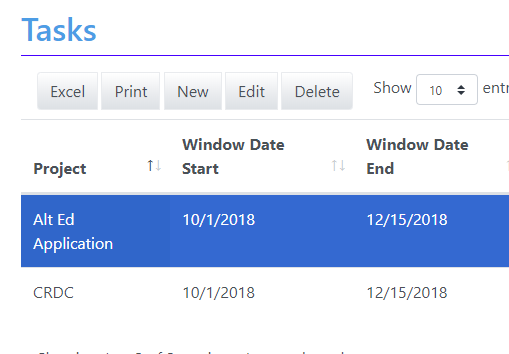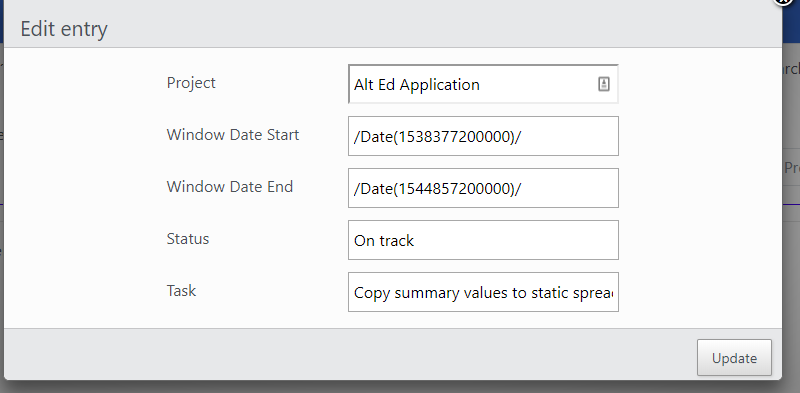Using GetFormatter to Convert JsonDate to date string
Using GetFormatter to Convert JsonDate to date string
In my situation, I am using Editor in an ASP.NET 5 application (.NET Framework) with a SQL Server 2014 database.
I have everything defined just as I need it... except for that pesky Json datetime format issue. While there are many posts here and in Stack Overflow talking about converting the .NET Json datetime format (e.g., /Date(1538377200000)/) to a date format (e.g, 10/1/2018), those questions focus on rendering DataTables cell data in the desired format.
Using the DataTables configuration, I can render the dates so that they appear as desired in the table (see screenshot).

My problem is when I add or edit a record. The json format date is shown (see screenshot).

How can I change the formatting in the New/Edit dialog so that the dates appear in date format rather than JSON datetime format? I figure I need a SetFormatter, but I haven't yet found any examples for this specific operation. Maybe that's the missing item?
The code style you see comes from existing Editor documentation and a few helpful Stack Overflow answers.
Editor code in Controller
[AcceptVerbs(HttpVerbs.Get | HttpVerbs.Post)]
public ActionResult EditorTable()
{
var settings = Properties.Settings.Default;
var formData = HttpContext.Request.Form;
using (var db = new Database(settings.DbType, settings.DbTaskManagementConnection))
{
var response = new Editor(db, "Tasks", "Id")
.Model<Tasks>()
.Field(new Field("Project"))
.Field(new Field("WindowDateStart")
.SetFormatter((val, data) =>
DeserializeObject<DateTime>(WrapStringInQuotes(val.ToString())))
)
.Field(new Field("WindowDateEnd")
.SetFormatter((val, data) =>
DeserializeObject<DateTime>(WrapStringInQuotes(val.ToString()))))
.Field(new Field("Status"))
.Field(new Field("Task"))
.Process(formData)
.Data();
return Json(response, JsonRequestBehavior.AllowGet);
}
}
**jQuery code in View **
var editor;
$(() => {
$.fn.dataTable.moment('M/D/YYYY');
function convertJsonDateToShortDate(data) {
// This function converts a json date to a short date
// e.g. /Date(1538377200000)/ to 10/1/2018
const dateValue = new Date(parseInt(data.substr(6)));
return dateValue.toLocaleDateString();
}
editor = new $.fn.dataTable.Editor({
ajax: "@Url.Action("EditorTable")",
table: "#Tasks",
order: [[1, "asc"]],
fields: [
{
label: "Project",
name: "Project"
},
{
label: "Window Date Start",
name: "WindowDateStart",
type:"datetime",
format: "MM/DD/YYYY"
},
{
label: "Window Date End",
name: "WindowDateEnd",
type: "datetime",
format: "MM/DD/YYYY"
},
{
label: "Status",
name: "Status"
},
{
label: "Task",
name: "Task"
}
],
columns: [
{ data: "Project" },
{ data: "WindowDateStart" },
{ data: "WindowDateEnd" },
{ data: "Status" },
{ data: "Task" }
]
});
var dataTableConfig = {
dom: "Blftipr",
buttons: [
"excelHtml5",
"print",
{ extend: "create", editor: editor },
{ extend: "edit", editor: editor },
{ extend: "remove", editor: editor }
],
ajax: {
url: "@Url.Action("EditorTable")",
type: "POST"
},
columns: [
{ data: "Project" },
{
data: "WindowDateStart",
render: function(data) {
//This formats json dates as shortdates in the table
return convertJsonDateToShortDate(data);
}
},
{
data: "WindowDateEnd",
render: function(data) {
//This formats json dates as shortdates in the table
return convertJsonDateToShortDate(data);
}
},
{ data: "Status" },
{ data: "Task" }
],
select: {
style: "os",
selector: "td"
}
};
$('#Tasks').DataTable(dataTableConfig);
});
In case you're interested what the SQL Server side looks like, it's in a very simple state.
use TaskManagement;
IF OBJECT_ID('dbo.Tasks', 'U') IS NOT NULL
DROP TABLE dbo.Tasks;
GO
CREATE TABLE dbo.Tasks (
Id INT NOT NULL identity(1, 1),
Project NVARCHAR(50) NOT NULL,
WindowDateStart date NOT NULL,
WindowDateEnd date NOT NULL,
[Status] NVARCHAR(50) NOT NULL,
Task NVARCHAR(max) NOT NULL,
CONSTRAINT PK__Tasks PRIMARY KEY CLUSTERED ([Id] ASC) WITH (
PAD_INDEX = OFF,
STATISTICS_NORECOMPUTE = OFF,
IGNORE_DUP_KEY = OFF,
ALLOW_ROW_LOCKS = ON,
ALLOW_PAGE_LOCKS = ON
)
);
INSERT INTO dbo.Tasks (
Project,
WindowDateStart,
WindowDateEnd,
[Status],
Task
)
VALUES (
'Alt Ed Application',
'10/1/2018',
'12/15/2018',
'On track',
'Copy summary values to static spreadsheets'
),
(
'CRDC',
'10/1/2018',
'12/15/2018',
'On track',
'Get course enrollment records from last year''s archived Schoolmaster.'
);
SELECT *
FROM dbo.Tasks
Thank you
Answers
So I tried this in the Editor code.
By doing a debug session, I know that the GetFormatter is returning a Short Date String (e.g.,
10/11/2018), and yet I'm still getting JSON date format when editing date records.I tried deconstructing GetFormatter a little more. On the C# side, it looks to me as if I am seeing the correct data returned.
In the Visual Studio output (when I run the app in debug mode) I see:
However, when I look in Chrome developer tools, I see this in the Network > XHR screen:
When loading the page
And when I'm editing a page
So it appears that something else is transforming the date string to Json dates outside of the Editor ActionResult.
I finally got this to work. The key was in the
fieldssection of the$.fn.dataTable.Editor()function.I only have SetFormatter code in the MVC controller.
You are an amazing human. Thank you very much for saving me so much time with this